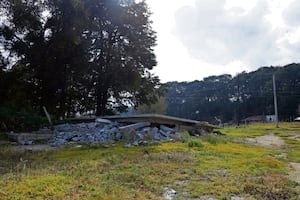On Friday, officials acknowledged the flaws in the operation to arrest Ovidio Guzmán , the son of Joaquín “El Chapo” Guzmán , who they released during shootouts with drug cartels in Culiacán , in the state of Sinaloa ; nevertheless, President López Obrador insists his security strategy is working.
On October 17 , cartel gunmen surrounded around 35 police officers and national guards in Culiacán and forced them free Ovidio Guzmán , after his brief arrest set off several shootings and a jailbreak in the city.
Security forces were attempting to enforce a judge’s arrest warrant against Ovidio Guzmán for his extradition , drawing a fierce response from the Sinaloa cartel , the government explained.
After the incident, López Obrador was widely criticized on social media and by security experts , who said that authorities risked encouraging similar actions by giving in to the cartel 's demands and that the retreat from Culiacán gives the impression that the cartel, not the government, is in control.
Furthermore, government officials said the operation in Culiacán had not been planned as well as it should have been.
“It was done hastily, the consequences were not considered, the riskiest part wasn’t taken into account,” Defense Minister Luis Cresencio Sandoval said during a press conference in Culiacán , alongside Security Minister Alfonso Durazo , who called the attempt to capture the son of Guzmán a “ failure ,” Sandoval said he had reports of at least 8 deaths, including five suspected cartel members.
Durazo
admitted he and military officials were not told about the mission to arrest the alleged cocaine trafficker in time, calling it a bureaucratic error. Later, Durazo said the government’s decision to free Ovidio Guzmán “involved absolutely no negotiation.” Nevertheless, questions about how the release was handled continued circulating after defense minister Sandoval said 9 security personnel were “held and freed without injury.”
The violent reaction to Ovidio Guzmán ’s detention in an affluent area of Culiacán was on a scale rarely seen during Mexico’s long drug wars .
One Facebook user claimed to have stumbled on two dead bodies in the street, suggesting the death toll could rise in the city, where the gunmen staged 14 attacks on the armed forces and 19 roadblocks where they burned vehicles.
Footage shared through social media showed panicked residents fleeing and gunfire ringing out across the city. People cowered in shopping centers and supermarkets and black smoke rose across the sky. Chaos worsened after a large group of inmates escaped from the city prison .
Furthermore, there seem to be contradicting versions surrounding the arrest and release of El Chapo's son . López Obrador said police arrived in a house in Culiacán to capture Ovidio Guzmán , contradicting the initial version, which was that officers had come under fire from the building while passing, then found Guzmán inside.
Moreover, the U.S. Department of Justice issued an indictment against Ovidio and one of his brothers in February 2019 , charging them with conspiracy to distribute cocaine , methamphetamine , and marijuana in the U.S.
Despite the chaos in Culiacán , the President defended the government’s response and rejected the suggestion the government had showed weakness by releasing Guzmán.
“Capturing a criminal can’t be worth more than people’s lives,” he said, adding that officials “did well” to free Ovidio Guzmán . “We don’t want dead people, we don’t want war,” López Obrador said.
What is more, López Obrador argued that the decision to free Ovidio Guzmán put a stop to the shootings and saved lives.
Today, during his daily news conference, Obrador said his government still plans to arrest Ovidio Guzmán as long as the operation doesn't put innocent lives at risk.
gm
Noticias según tus intereses
[Publicidad]
[Publicidad]















